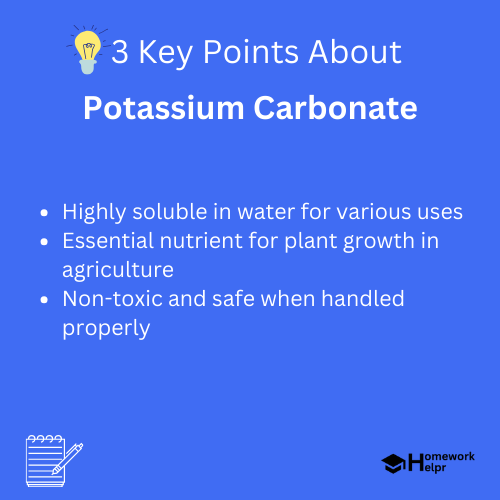📝 Summary
Potassium carbonate, with the chemical formula K2CO3, is a colorless, water-soluble salt widely used in agriculture, industry, and households. It derives from the reaction of potassium hydroxide and carbon dioxide or from plant ashes, also known as pearl ash. Its notable properties include high solubility and non-toxic nature, making it vital in applications such as fertilizers and detergents. Additionally, potassium carbonate plays a role in chemical reactions, enhancing its utility. Understanding its properties and uses is essential for appreciating its significance in chemistry.
Potassium Carbonate: An Essential Compound in Chemistry
Potassium carbonate, often represented by the chemical formula K2CO3, is a colorless salt that is soluble in water. It has a wide range of applications in various fields, including agriculture, industry, and even in our households. This article aims to delve into the properties, uses, and significance of potassium carbonate, providing a comprehensive understanding suitable for students and children alike.
What is Potassium Carbonate?
Potassium carbonate is an inorganic salt, derived from the reaction of potassium hydroxide with carbon dioxide. It can also be obtained from the ashes of plants, which is why it’s often referred to as pearl ash. This compound has notable physical and chemical properties that make it immensely useful.
In its pure form, potassium carbonate appears as a white, crystalline powder. It is hygroscopic, meaning it can absorb moisture from the air, which is crucial in its storage and usability. Additionally, it has a high melting point of about 891°C and decomposes upon heating, releasing carbon dioxide and forming potassium oxide.
Definition
Hygroscopic: A property of a substance that allows it to absorb moisture from the atmosphere.
Properties of Potassium Carbonate
The properties of potassium carbonate include a range of physical and chemical characteristics that make it unique among various salts. Here are some of the significant properties:
- Solubility: Potassium carbonate is highly soluble in water, which facilitates its use in various applications.
- Alkalinity: The compound is alkaline, which means it has a high pH (above 7). This is important in agricultural applications.
- Non-toxic: Unlike many other chemicals, potassium carbonate is considered non-toxic to humans and animals when handled properly.

Uses of Potassium Carbonate
Potassium carbonate has an extensive range of uses across numerous industries. Here are some of its primary applications:
- Agriculture: It serves as a source of potassium, an essential nutrient for plant growth. Farmers often use it as a fertilizer to improve soil quality and crop yield.
- Glass Manufacturing: In the glass industry, potassium carbonate is added to formulations to produce glass with desirable properties, such as durability and resistance to shock.
- Cleansers: It acts as a cleaning agent in household products, particularly in softening water, making detergents more effective.
- Food Industry: Potassium carbonate is used in various food preparations. It has a role as a food additive and is often found in baking, helping with the leavening process.
❓Did You Know?
Did you know that potassium carbonate was once primarily obtained from the ashes of plants? The name “potash” comes from the process of leaching wood ashes in pots!
Chemical Reactions Involving Potassium Carbonate
Potassium carbonate participates in several important chemical reactions, which underpin its utility in various applications. Below are a few key reactions:
- Reaction with Acids: When potassium carbonate reacts with acids, it produces potassium salts, carbon dioxide, and water. For example:
K2CO3 + 2HCl ‚Üí 2KCl + CO2 + H2O - Formation of Potassium Hydroxide: Heating potassium carbonate with water can yield potassium hydroxide:
K2CO3 + H2O ‚Üí 2KOH + CO2
Examples
For instance, if you mix potassium carbonate with hydrochloric acid, you would notice bubbling due to the release of carbon dioxide gas!
Health and Safety Considerations
While potassium carbonate is generally regarded as non-toxic, safety precautions should be observed while handling it. Here are some essential safety tips:
- Wear Gloves: When working with potassium carbonate, it is advisable to wear gloves to avoid skin irritation.
- Protective Eyewear: Always wear goggles to protect your eyes from any splashes, especially in a lab setting.
- Proper Ventilation: Ensure the area is well-ventilated to avoid inhaling any dust from the compound.
Definition
Inhalation: The act of breathing in; it can pose health risks if harmful substances are present in the air.
Potassium Carbonate in Everyday Life
Many people don’t realize that potassium carbonate plays a role in their everyday lives. Its applications go beyond industry; it can be found in common household products:
- Detergents: Many laundry detergents contain potassium carbonate to enhance their cleaning power.
- Food Additives: It may be used in some packaged foods as a stabilizer or leavening agent.
- Potassium-rich Foods: Foods like bananas and sweet potatoes naturally contain potassium, which the body needs for many functions.
Examples
In baking, potassium carbonate can help baked goods rise, similar to the effect of baking powder!
Conclusion
Potassium carbonate is a vital compound that plays critical roles across various sectors, including agriculture, manufacturing, and even our kitchens. Understanding its properties, uses, and safety considerations can provide a valuable foundation for students, helping them appreciate the complexities of chemistry and its practical applications. As science continues to advance, potassium carbonate’s relevance is likely to endure, highlighting its importance in our world.
Next time you encounter potassium carbonate, whether in a classroom experiment or as an ingredient in your favorite dishes, you can understand not just its functionality but also the science behind it!
Related Questions on Potassium Carbonate
What is potassium carbonate?
Answer: It is a colorless, water-soluble salt.
How is potassium carbonate used in agriculture?
Answer: It acts as a source of potassium for plants.
Is potassium carbonate toxic?
Answer: It is considered non-toxic when handled properly.
What should be worn for safety?
Answer: Gloves and protective eyewear are recommended.
